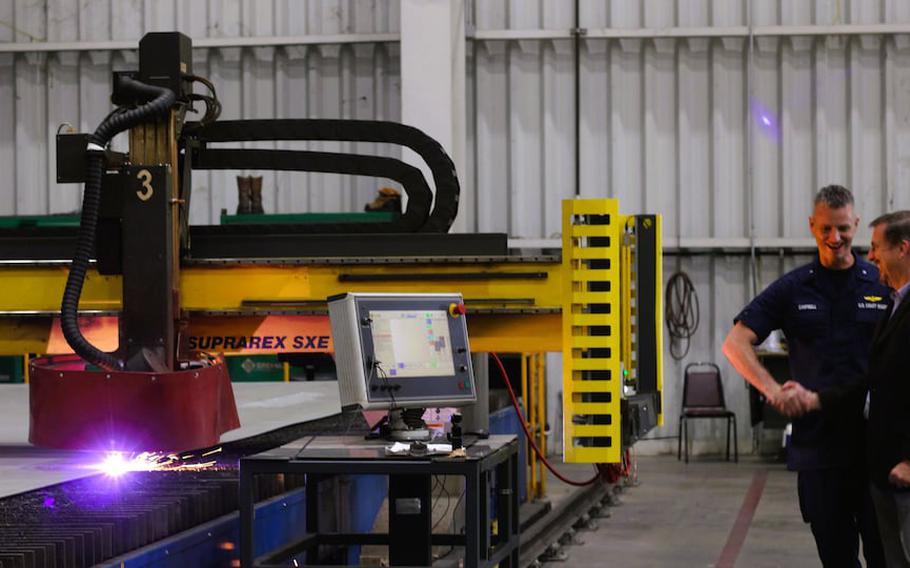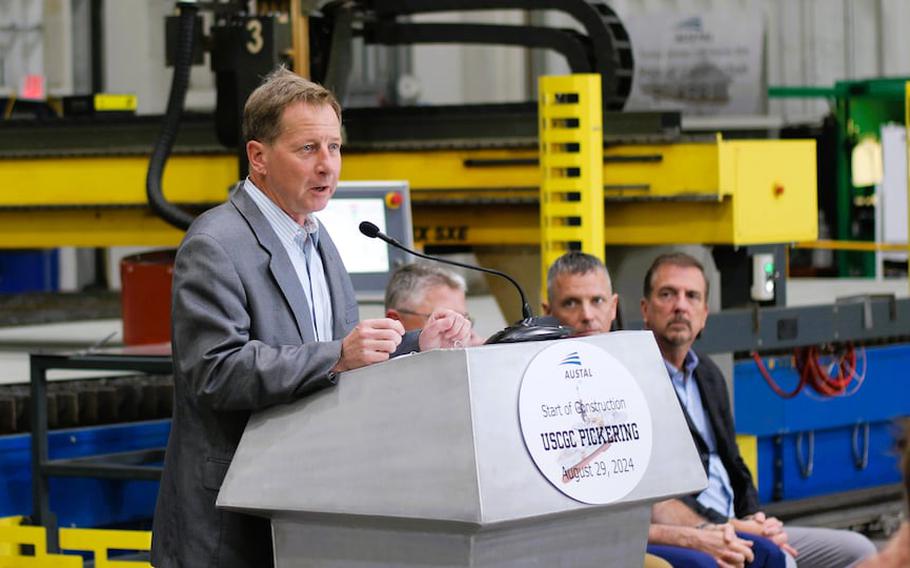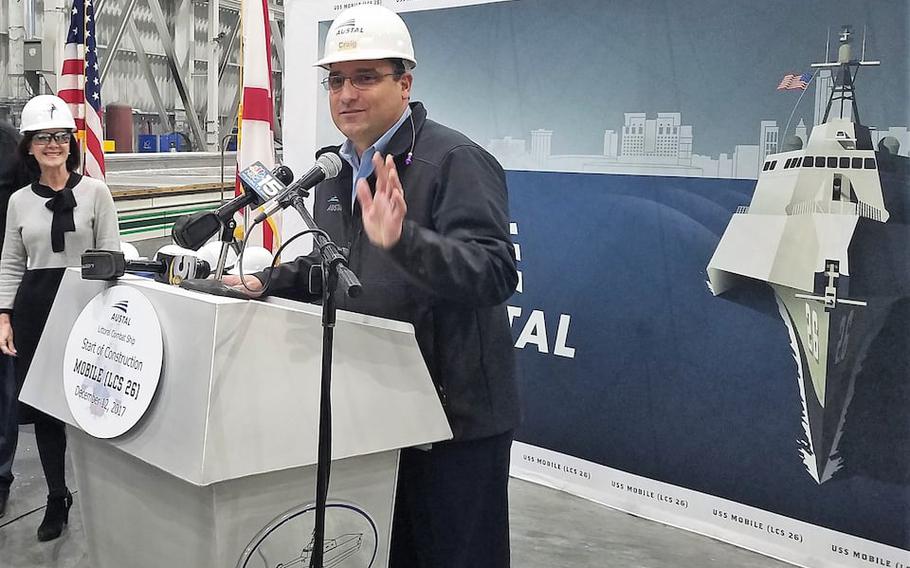
As a plasma cutter carves steel plating that will become part of the future U.S. Coast Guard cutter Pickering, Read Adm. Mike Campbell shakes hands with Bill Bingle, right, a program manager for Austal USA. (Lawrence Specker/Al.com via TNS)
(Tribune News Service) — As Austal USA made the first cut of steel on a massive Coast Guard shipbuilding program on Thursday, the opening of a promising new chapter coincided with the closing of an older, more problematic one.
Separately from the festivities around the symbolic start of work on the U.S. Coast Guard’s Offshore Patrol Cutter program, the Mobile-based shipmaker has announced a “global settlement” with federal agencies over financial irregularities in its Littoral Combat Ship program in the years 2013 to 2016.
Terms of the settlement include a $24 million penalty and the empowerment of an independent monitor who will assess Austal USA’s compliance with a plea agreement with the U.S. Department of Justice. The monitor also will “confirm the effectiveness of its [Austal USA’s] compliance program and internal controls.”
Austal USA’s bread and butter for the past decade has been two aluminum ships built for the U.S. Navy: The Independence-class Littoral Combat Ship (LCS) and the Expeditionary Fast Transport (EPF). With the writing on the wall for both those programs, Austal leadership moved several years ago to develop the capacity to build steel ships as well. Of the several steel contracts it has won, the Offshore Patrol Cutter (OPC) is by far the biggest: Austal could build up to 11 over the vessels, and the total value of the work is estimated at up to $3.3 billion.
Rear Adm. Mike Campbell, director of the Coast Guard’s Acquisition Programs and program executive officer, said the occasion was “a major milestone for the city of Mobile — a Coast Guard city — the state of Alabama, the greater Gulf Coast region and the nation as a whole.”
“Today, the great women and men of Austal USA will start the economic engine of an incredible shipbuilding production line that we intend to run continuously over the next decade,” Campbell said. “And that will produce up to 11 world-class Coast Guard cutters incredibly capable to perform Coast Guard missions.
“This endeavor will directly contribute to thousands of well paid, and more importantly, meaningful jobs for thousands of families, both in the Mobile area and nationwide,” Campbell continued. “So this event today marks a milestone that is far greater and more impactful than it might seem.”
Larry Ryder, Austal USA’s vice president of business development and external affairs, said he expected Austal to add well over 1,000 new jobs as the cutter program and other steel shipbuilding projects ramp up. At a July groundbreaking for another expansion, Ryder said the company’s workforce was at about 3,100, with expectations that it would grow to over 4,000.
The OPC is a 360-foot-long vessel with the ability to stay at sea for 60 days while covering more than 9,000 nautical miles. According to materials displayed at Thursday’s ceremony, the OPCs will be capable of serving as mobile command and control platforms for “surge operations such as hurricane response, mass migration incidents and other events;” can perform a wide range of law enforcement missions; and can be deployed anywhere in the world. Austal is the second yard commissioned to build them, after Florida-based Eastern Shipbuilding.
Campbell described the OPC program as “the largest and most significant acquisition in the history of the Coast Guard.” They will replace vessels that have been in service for up to 50 years, he said, and will be workhorses for decades to come.

Larry Ryder, Austal USA’s vice president of business development and external affairs, speaks at an Aug. 29, 2024, ceremony marking the start of construction on the first Coast Guard Offshore Patrol Cutter to be built at the Mobile shipyard. (Lawrence Specker/Al.com via TNS)
The USCGC Argus, the first ship in the class, is expected to be commissioned this fall. Ryder said Thursday that Austal USA will take about three years to deliver its first OPC to the Coast Guard. The first Austal-built OPC will be commissioned as the USCGC Pickering.
Campbell painted a glowing picture not just of Austal USA, but of workforce development programs in the region that help train Austal workers.
“Your collaboration with Austal USA in developing a skilled workforce is crucial to sustaining our shipbuilding industry that directly supports our nation’s maritime safety and security,” he said. “Our shipbuilding industrial base is not as robust as it once was and that poses a strategic risk to national security. The United States Navy and the United States Coast Guard have significant shipbuilding needs that will continue for decades to come. And our nation depends upon a strong shipbuilding industry to support those strategic needs. Now more than ever, a strong shipbuilding sector is an absolutely crucial cornerstone that enables our United States Navy, United States Coast Guard and merchant mariners to perform their essential missions that guarantee our nation’s maritime safety, security and economic prosperity.
“Through your educational and training programs, you ensure that our shipbuilding industry is able to continue to hire and grow a highly skilled and talented workforce,” Campbell said. “Through your technical training and education programs and your partnership with shipyards like Austal USA, your role in training the next generation of professionals is critical to our national security. I want to thank you for your impactful contributions.”
Ryder said the OPC program was “a huge win for Austal.”
“We won this program a few years back when our future was a little bit uncertain,” he said. “We were looking at downsizing. … It’s a big program. It’s foundational. It’s a lot of jobs and it’s a new customer for us working with the Coast Guard. And with the Coast Guard being as big a part of the Mobile area as it is, it’s just a perfect match.”
The legal settlement didn’t come up at Thursday’s ceremony, and an Austal USA spokesperson said that the company would have no comment to add to a formal statement issued earlier this week by its Australian parent company, Austal Ltd.
In that matter, Austal’s difficulties go back to the early days of the Littoral Combat Ship program. From 2013 onward, Austal USA underestimated costs on the first few ships and Austal Ltd. only belatedly became aware of the problem. When it did, in 2016, it had to absorb an unexpected loss.
In that case, there was investigation into whether the handling of the news violated regulations of the Australian stock exchange. Austal Ltd. said that in 2022 it had “resolved an investigation by the Australian Securities and Investment Commission, agreeing to a civil contravention and a $650,000 [Australian] penalty.”
There were other ramifications. In January 2019, Austal USA’s offices in Mobile were raided by federal agents. At the time and afterward, very little was revealed about what exactly was being investigated. Austal USA’s CEO, Craig Perciavalle, resigned abruptly in February 2021, and in March 2021 he and two other Austal USA executives were indicted on charges of conspiracy to commit wire fraud, wire fraud and wire fraud affecting a financial institution.

Craig Perciavalle, then CEO of Austal USA, speaks at a December 2017 ceremony in which the first cut was made on metal that would become part of the future USS Mobile. At left is sponsor Rebecca Byrne, wife of U.S. Rep. Bradley Byrne. (Lawrence Specker/Al.com via TNS)
Perciavalle, former financial analysis director Joseph Runkel and former LCS program director William O. Adams entered pleas of not guilty. According to a recent scheduling order, it appears that parties in those cases expect pretrial proceedings to continue deep into 2025.
The settlement announced this week had multiple components and involved both Department of Justice and the Securities and Exchange Commission.
A small piece of the resolution concerned allegations brought under the False Claims Act. The Department of Justice announced that Austal USA had agreed to pay $811,259 “to resolve allegations that it violated the False Claims Act by knowingly supplying valves that did not meet military specifications.” The allegation was that Austal “invoiced for military grade high performance butterfly valves and triple offset butterfly valves it installed on five LCS hulls when it knew the valves had not met the testing requirements to be deemed military grade.”
The statement included some stern language: Darrin K. Jones, special agent in charge for the Department of Defense Office of Inspector General’s Defense Criminal Investigative Service, Southeast Field Office, said that “Supplying nonconforming parts to the Department of Defense (DoD) compromises military systems and potentially endangers the lives of U.S servicemembers.” Greg Gross, special agent in charge of the Navy Criminal Investigative Service’s Economic Crimes Field Office, said that “Product substitution risks degrading warfighter capability and wastes U.S. taxpayer dollars.”
However, the agreement itself made clear that it “is neither an admission of liability by Austal USA nor a concession by the United States that its claims are not well founded.”
The larger matter, concerning the concealment of the true cost of building the first few Littoral Combat Ships and the subsequent impact on stockholders, Austal USA agreed to pay a penalty of $24 million, in addition to various stipulations of a plea agreement to resolve criminal charges.
“Austal USA, a shipbuilder for the U.S. military, engaged in a years-long scheme to illegally inflate its profits on ships the company was building for the U.S. Navy, reporting false financial results to investors, lenders, and its auditors,” Principal Deputy Assistant Attorney General Nicole M. Argentieri, head of the Justice Department’s Criminal Division, said in a statement released by the Department of Justice. “The investing public, the U.S. Navy, and the Defense Contract Audit Agency relied on Austal USA to tell the truth about its financial condition and its performance on U.S. Navy contracts. Today’s guilty plea underscores the Department of Justice’s commitment to holding U.S. government contractors accountable for their criminal misconduct and ensuring that they engage honestly with the U.S. government.”
That DOJ statement summarized the allegations thusly:
According to court documents, from at least in or around 2013 through at least in or around July 2016, Austal USA and its co-conspirators conspired to mislead Austal Limited’s shareholders, independent financial statement auditors and the investing public about Austal USA’s financial condition. Specifically, Austal USA artificially suppressed an accounting metric known as an “estimate at completion” (EAC) in relation to multiple Littoral Combat Ships that Austal USA was building for the U.S. Navy. Suppressing the EACs had the effect of falsely overstating Austal USA’s profitability on those shipbuilding efforts and Austal Limited’s earnings reported in its public financial statements. Austal USA and its co-conspirators manipulated the EAC figures in part by using so-called “program challenges,” which were false plug numbers to hide growing shipbuilding costs that should have been incorporated into the company’s financial statements. Austal USA did this to maintain and increase the share price of Austal Limited’s stock. When the higher costs were eventually disclosed to the market, Austal Limited wrote down over $100 million, and the stock price was significantly negatively impacted.
An SEC statement alleged that Austal Ltd. and Austal USA had acted “knowingly or with severe recklessness,” and offered its own summary of the situation:
According to the SEC’s complaint, from at least January 2013 through July 2016, the Austal companies engaged in a scheme to artificially reduce by tens of millions of dollars the estimated cost to complete certain shipbuilding projects for the U.S. Navy. The complaint alleges that Austal USA knew that its shipbuilding costs were rising and higher than planned, but arbitrarily lowered the cost estimates to meet Austal USA’s revenue budget and projections. The complaint further alleges that based on this fraudulent manipulation of the cost estimates, Austal Limited prematurely recognized revenue and, as a result, met or exceeded analyst consensus estimates for earnings before interest and tax, known as EBIT, a key financial metric for the company.
The Department of Justice statement said that it gave Austal USA “credit for affirmative acceptance of responsibility and limited credit for its cooperation with the department’s investigation.”
“Austal USA also engaged in remedial measures, but those remedial measures were untimely and incomplete, including that Austal USA did not begin disciplining employees involved in the misconduct until more than two years after Austal USA learned of the government’s investigation and did not undertake any independent steps to make restitution to the victims of its securities fraud scheme,” said the DOJ statement. “Austal USA has begun remediating weaknesses in internal controls that allowed the company’s misconduct to occur, but Austal USA’s remediation of its controls is still ongoing and requires additional improvements and testing.”
The DOJ statement said that in the plea agreement, which has not yet been accepted by the court, Austal USA “pleaded guilty to one count of securities fraud and one count of obstruction of a federal audit.” And it suggested the multimillion-dollar penalty could have been higher.
“Based on application of the U.S. Sentencing Guidelines, the department determined that the appropriate criminal penalty is $73,572,680.10,” said the DOJ. “However, due to Austal USA’s demonstrated inability to pay the criminal fine, Austal USA and the department agreed, consistent with the department’s inability to pay guidance, that Austal USA would pay a criminal fine of $24 million and restitution of up to $24 million for losses to Austal Limited shareholders. The department has agreed to credit all of the criminal fine and restitution against amounts Austal USA will pay to resolve an investigation by the SEC for related conduct.”
Austal Ltd., for its part, stressed that the complaints stemmed from “actions between 2013 and 2016 of former Austal USA employees.” It said that “The U.S. global resolution, once approved, ends all investigations into the events leading up to the July 2016 write back” on Austal Ltd. profits.
“The investigations focused on conduct that occurred over 8 years ago, and with a large order book of work ahead of us, we need to concentrate on the future—not the past,” said Austal Ltd’s Non-Executive Director and immediate past Chairman John Rothwell. “Our customers have been understanding that the actions of a few do not represent the values of Austal and the 5,000 people it employs.”
“Settling this action is the best outcome for Austal,” Rothwell said. “Upon learning of this issue, Austal conducted its own independent investigation. The responsible individuals are no longer with the Company, and we have made numerous governance changes to prevent similar issues from occurring again. Austal is committed to maintaining strong financial systems and controls.”
Throughout the investigative process, Austal USA has continued to build U.S. Navy ships and to win new Navy contracts.
Austal Ltd.’s statement said that the company “is in advanced discussions with the US Navy regarding the impact of these issues, and is seeking to enter into an associated Administrative Agreement with the US Navy.
“This Administrative Agreement would set out the remedial measures taken by the company to date, ongoing commitments to compliance and providing access to US Navy representatives to Management, future reporting obligations, and the retention of an independent compliance monitor,” the statement said. “This is a key element of the Company maintaining its standing as a presently responsible contractor to the US Government – a requirement for eligibility to undertake contracts for the US Navy and Coast Guard.”
©2024 Advance Local Media LLC.
Visit al.com.
Distributed by Tribune Content Agency, LLC.